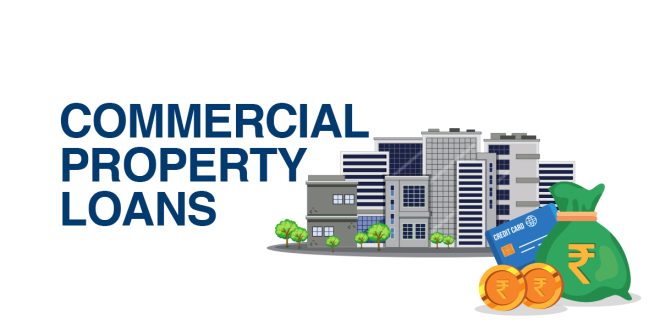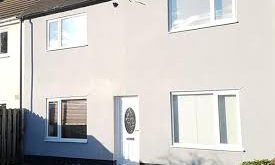When it comes to growing or expanding your business, securing the right financing can make all the difference. One of the most common methods for financing business growth is through a commercial property loan. Whether you’re purchasing a new property, refinancing an existing one, or expanding your current operations, understanding the ins and outs of commercial property loans is crucial for making the right decision.
In this guide, we’ll dive into the different types of commercial property loans, what lenders look for, how to qualify, and more. Plus, we’ll include real-life case studies, FAQs, and how Commercial Lending USA can help you secure the financing you need.
What Is a Commercial Property Loan?
A commercial property loan is a mortgage loan specifically designed for properties used for business purposes. These loans are commonly used for the acquisition, development, and construction of commercial real estate, such as office buildings, retail centers, warehouses, and multifamily apartment complexes.
Unlike residential loans, commercial loans involve more significant sums of money and stricter qualifications due to the higher risks associated with commercial ventures. It’s essential to work with a lender who understands these intricacies—this is where Commercial Lending USA comes in, offering tailored solutions to meet your needs.
Types of Commercial Property Loans
When you’re in the market for a commercial property loan, it’s important to know which type best suits your business goals. Here are some common types of loans available:
Traditional Bank Loans
Traditional commercial loans from banks often come with favorable interest rates and long-term repayment options. However, these loans have stringent qualification requirements, including a solid business plan, strong financials, and an excellent credit score.
SBA 504 and 7(a) Loans
Backed by the Small Business Administration (SBA), these loans are designed for small businesses looking to purchase or improve their commercial real estate. SBA 504 loans are typically used for real estate or equipment purchases, while SBA 7(a) loans are more flexible and can be used for a variety of purposes, including working capital and expansion.
Bridge Loans
Bridge loans offer temporary financing to bridge the gap between acquiring a property and securing long-term financing. These loans usually have higher interest rates but are useful when you need to act quickly in a competitive market.
Key Factors Lenders Consider for Commercial Property Loans
When applying for a commercial property loan, lenders will evaluate several key factors to determine your eligibility and loan terms. Here’s what they look for:
Creditworthiness
The approval process is heavily influenced by your business and personal credit scores. Lenders want to see that you’ve successfully managed credit in the past and have the capacity to repay the loan.
Loan-to-Value (LTV) Ratio
The loan amount and the property’s appraised value are compared using the LTV ratio. Most lenders require an LTV ratio of around 75-80%, meaning you’ll need to provide a substantial down payment.
Property Valuation and Location
The property’s value and its location are also crucial. A commercial property in a high-demand area is more likely to secure favorable terms than one in a less desirable location.
How to Be Eligible for a Loan for Commercial Real Estate
Qualifying for a commercial property loan can be challenging, but with the right preparation, you can increase your chances of approval. A general list of everything you’ll need is as follows:
Documentation Required
Financial Statements: Your company’s balance sheets, income statements, and tax returns from the last few years.
Business Plan: A detailed business plan that outlines your strategy for generating revenue and managing the property.
Property Details: Information about the commercial property, including an appraisal report, zoning details, and income projections.
Credit History: Both your personal and business credit reports.
Working with a Correspondent Lender
One way to streamline the process is by working with a correspondent lender like Commercial Lending USA, which offers in-house underwriting expertise. This not only speeds up the approval process but also allows for more tailored loan products that suit your specific business needs.
Interest Rates for Commercial Property Loans
Understanding how interest rates are determined for commercial loans can help you get the best deal possible. Here are some of the factors that influence commercial loan interest rates:
Market Conditions
Commercial loan rates are often influenced by broader economic trends, including the Federal Reserve’s interest rates and overall economic health.
Property Type and Location
Lenders may offer lower interest rates for properties in high-demand areas or those that are likely to generate significant income, such as retail centers or office buildings in major cities.
Fixed vs. Variable Interest Rates
It’s also important to decide between a fixed-rate and variable-rate loan. Fixed rates remain constant over the life of the loan, while variable rates can fluctuate with market conditions. Each option has its pros and cons, depending on your risk tolerance and business needs.
Commercial Property Loans for Different Business Needs
Commercial property loans aren’t one-size-fits-all. Depending on your business goals, you may need a specific type of loan to suit your situation. Here are some examples:
Purchasing Commercial Property
If you’re purchasing a new property to expand your business, a traditional or SBA loan might be the best fit. These loans typically offer longer repayment terms and lower interest rates.
Refinancing Commercial Property
If you already own a commercial property, refinancing your existing loan can help you secure a lower interest rate, reduce your monthly payments, or free up cash for other business needs.
Expanding or Developing Property
For businesses looking to expand or develop new commercial spaces, construction loans or bridge loans can provide the necessary funds to get started.
Case Study 1: How One Retail Owner Expanded with a Commercial Loan
Challenge: A retail store owner in Florida was looking to expand her business by purchasing a new storefront but was concerned about high down payment requirements and interest rates.
Solution: By working with Commercial Lending USA, she secured an SBA 504 loan with a lower down payment and favorable interest rates, allowing her to purchase the new property without draining her cash reserves.
Outcome: The new storefront increased foot traffic, and her revenue grew by 30% within the first year.
Case Study 2: Turning a Vacant Property into a Thriving Office Space
Challenge: A business owner in California wanted to convert a vacant property into office spaces but needed a short-term financing solution while he finalized long-term tenants.
Solution: Commercial Lending USA helped him secure a bridge loan to finance the property acquisition, with plans to refinance into a traditional loan once leases were signed.
Outcome: The business owner quickly secured tenants and refinanced the bridge loan at a lower interest rate, generating a steady income stream from the office space.
The Role of a Correspondent Lender and Superbroker
Correspondent lenders and super brokers play a crucial role in securing the best possible loan for your commercial property. Here’s why:
How Correspondent Lenders Streamline the Process
A correspondent lender like Commercial Lending USA acts as an intermediary between you and various loan options, providing you with access to a wider range of financial products. This can be especially beneficial when navigating complex loans or when your business doesn’t meet traditional lending criteria.
Benefits of In-House Underwriting
With in-house underwriting expertise, Commercial Lending USA can process your loan application more efficiently and customize loan terms to suit your specific needs, ensuring faster approval and a smoother overall experience.
FAQs
What is the minimum down payment for a commercial property loan?
Most commercial property loans require a down payment of 20-30%, although SBA loans may offer lower down payment options.
How long does the approval process take?
The approval process can vary but typically takes anywhere from a few weeks to a couple of months, depending on the complexity of the loan and the documentation required.
Can I use a commercial property loan for mixed-use properties?
Yes, many lenders, including Commercial Lending USA, offer financing options for mixed-use properties, as long as a significant portion of the property is used for commercial purposes.
Are there penalties for paying off a commercial loan early?
Some commercial loans may include prepayment penalties, so it’s essential to read the terms carefully. Commercial Lending USA can help you find a loan with minimal or no prepayment penalties.
Contact Us
Ready to explore your options for a commercial property loan? At Commercial Lending USA, we offer personalized loan solutions to meet your business needs. Contact us today to speak with one of our loan experts and get started on your financing journey!
 Diverse Perspectives: Insights & Stories Exploring Ideas, Sharing Knowledge
Diverse Perspectives: Insights & Stories Exploring Ideas, Sharing Knowledge





